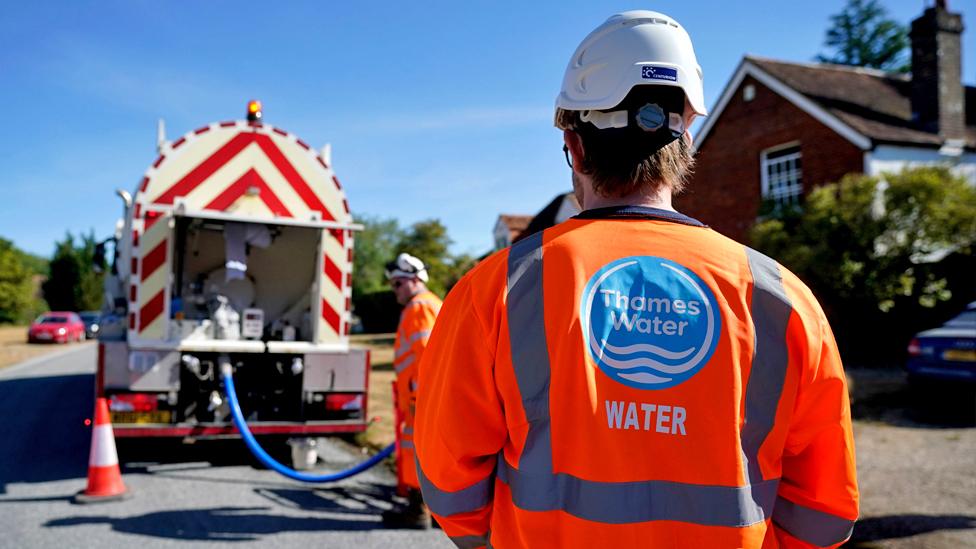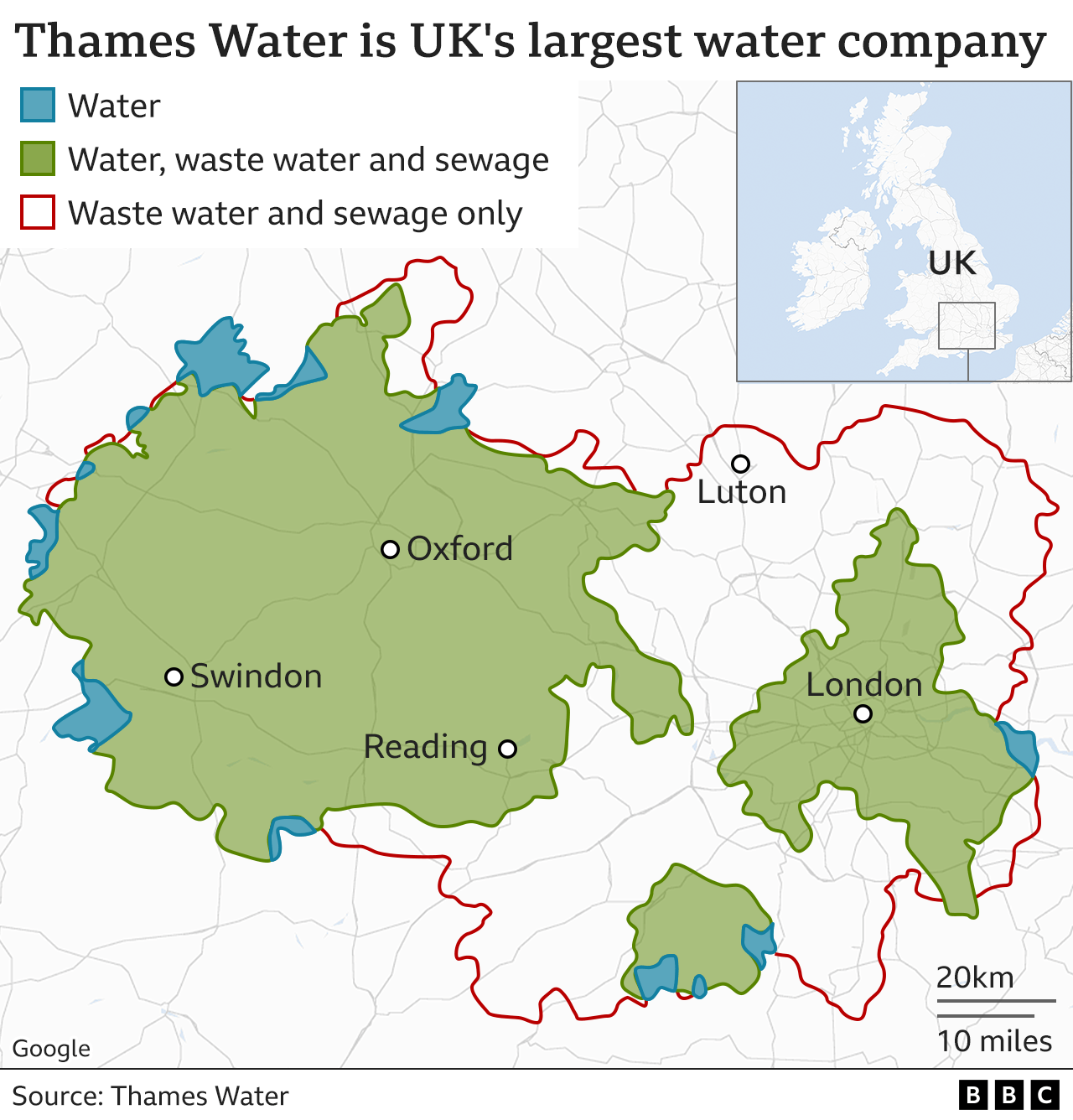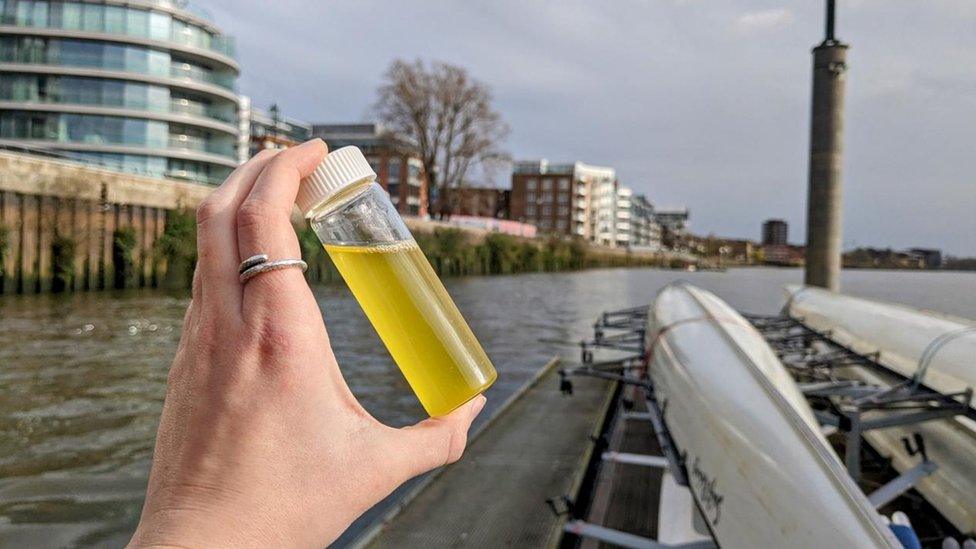Thames Water makes bid to lift bills by up to 44%
- Published
- comments

Thames Water is attempting to persuade the regulator to let it raise consumer bills by up to 44% over the next five years by increasing investment.
The heavily indebted water firm aims to spend at least £1.1bn more on environmental measures.
Regulator Ofwat had dismissed the company's original proposal, leading to questions over the firm's future.
Thames's huge debts have led to speculation it could be taken over by the government.
Thames is the UK's largest water company, with 16 million customers in London and the Thames Valley region.
However, it currently has debts of about £15.4bn and it has also come under fierce criticism for water leaks and sewage spillages.
Thames had originally proposed investing £18.7bn between 2025 and 2030 and increasing customer bills by 40%, on top of inflation, over the five-year period.
Ofwat dismissed this plan, prompting shareholders at Thames' parent company, Kemble Water, to withdraw a proposed cash injection and default on debt interest payments.
Thames has now proposed spending an extra £1.1bn on top of its original plans on "projects benefiting the environment", although it did not give details of what these would be.
The new total investment of £19.8bn would still require customer bills to rise by 40%, reaching an annual average bill of £608.30 by 2029-30.
But Thames also said it could potentially increase investment by another £1.9bn, although that would lead to average bills rising by 44% to £627.
Thames is by no means the only water company planning big prices rises over the next few years.
In plans put before Ofwat in October last year, Southern Water proposed a 66% price rise on top of inflation, while Severn Trent put forward a 37% increase.

Mike Keil, interim chief executive at the Consumer Council for Water, said: "On the surface, the proposal for more investment from Thames Water is a positive step for its customers that have endured some of the worst customer service in the sector."
However, he added that only 16% of its customers thought the proposed bill increases in the five-year plan were affordable.
"This announcement appears to offer nothing to ease the fears of those already struggling to pay," he said.
It is thought that a final decision from Ofwat will come at a crucial meeting on 23 May with a "draft determination" of what companies will be allowed to charge from next year issued on 12 June.
Thames Water's operating company has reassured its 16 million customers it has enough money in the bank to continue delivering water and waste services until May of next year.
Thames Water chief executive, Chris Weston, said: "Our business plan focuses on our customers' priorities... we've now updated it to deliver more projects that will benefit the environment.
"We will continue to discuss this with our regulators and stakeholders."

There are worries over pollution levels in the Thames
The company has been under fire for its environmental record, and in recent weeks pollution levels in the River Thames have come under renewed focus.
In last month's Oxford and Cambridge boat race, both crews were given safety advice to avoid swallowing water splashed up from the river.
Last week, television naturalist Steve Backshall described pollution found in the river as "toxic" after Bangor University analysis found high levels of norovirus and E. coli in water taken near the border between Berkshire and Buckinghamshire.
The samples were taken downstream from Little Marlow Sewage Treatment Works, although Thames Water said all discharges from the site had been fully compliant with environmental law.
Earlier this year, data from Thames Water, analysed by London's City Hall, showed the number of hours in which sewage was dumped into the River Thames more than quadrupled last year.
Debt pile
Analysts say Thames Water's current debt amounts to about 80% of the value of the business, making it the most heavily indebted of England and Wales' water companies.
A large proportion of its debt was added when Macquarie, an Australian infrastructure bank, owned Thames, with its debts standing above £10bn when the company was sold in 2017.
Macquarie said it invested billions of pounds in upgrading Thames's infrastructure, but critics have argued it took billions out of the company in loans and dividends.
Thames Water says it has not paid dividends to external shareholders since 2017.
However, dividends can also be used to move money around businesses owned by one parent company.
Thames Water has paid over £200m in dividends to other companies within the group in the past five years.
Related topics
- Published5 April 2024

- Published2 April 2024
